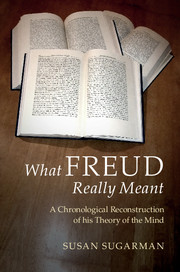Book contents
- Frontmatter
- Dedication
- Contents
- Acknowledgments
- Introduction
- 1 Freud on psychoanalysis: Five Lectures on Psychoanalysis (1909a)
- 2 The pleasure and reality principles: “Formulations regarding two principles in mental functioning” (1911); “The psychology of the dream-processes” from The Interpretation of Dreams” (1900)
- 3 Ambivalence and the origin of the civilized mind: “Taboo and emotional ambivalence” from Totem and Taboo (1913b)
- 4 Narcissism as a stage in development: “On narcissism: an introduction” (1914)
- 5 The impetus to the mind: “Instincts and their vicissitudes” (1915a)
- 6 The possibility of repression: “Repression” (1915b); “Negation” (1925a)
- 7 The unconscious and the structure of the mind: “The unconscious” (1915c)
- 8 Beyond the pleasure principle: Beyond the Pleasure Principle (1920)
- 9 A new architecture of the mind: The Ego and the Id (1923)
- 10 Pleasure revised: “An economic problem in masochism” (1924)
- 11 Civilization, morality, and the pursuit of pleasure: Civilization and its Discontents (1930)
- Epilogue: What Freud really meant
- References
- Index
3 - Ambivalence and the origin of the civilized mind: “Taboo and emotional ambivalence” from Totem and Taboo (1913b)
Published online by Cambridge University Press: 05 April 2016
- Frontmatter
- Dedication
- Contents
- Acknowledgments
- Introduction
- 1 Freud on psychoanalysis: Five Lectures on Psychoanalysis (1909a)
- 2 The pleasure and reality principles: “Formulations regarding two principles in mental functioning” (1911); “The psychology of the dream-processes” from The Interpretation of Dreams” (1900)
- 3 Ambivalence and the origin of the civilized mind: “Taboo and emotional ambivalence” from Totem and Taboo (1913b)
- 4 Narcissism as a stage in development: “On narcissism: an introduction” (1914)
- 5 The impetus to the mind: “Instincts and their vicissitudes” (1915a)
- 6 The possibility of repression: “Repression” (1915b); “Negation” (1925a)
- 7 The unconscious and the structure of the mind: “The unconscious” (1915c)
- 8 Beyond the pleasure principle: Beyond the Pleasure Principle (1920)
- 9 A new architecture of the mind: The Ego and the Id (1923)
- 10 Pleasure revised: “An economic problem in masochism” (1924)
- 11 Civilization, morality, and the pursuit of pleasure: Civilization and its Discontents (1930)
- Epilogue: What Freud really meant
- References
- Index
Summary
Conscience is the internal perception of the rejection of a particular wish operating within us.
– S. Freud, Totem and Taboo, p. 68Insofar as we live to satisfy our basic needs, which, as per the pleasure principle, amounts at bottom to reducing the excitation they cause, those needs may come into conflict with each other. Like the incursion of “reality” into the dictates of the pleasure principle, such conflict occasions a major step forward in the development of the mind. This chapter tracks Freud's account of that development in the second chapter of his Totem and Taboo (1913b) entitled “Taboo and emotional ambivalence.”
In Totem and Taboo, Freud makes his first attempt to apply the findings of psychoanalysis, which have until then been drawn from the study of individuals, to broader problems of societal life. In this new effort Freud takes the bold step of comparing so-called primitive tribes as known through the work of anthropologists, neurotic individuals of his own culture, and contemporary children.
Although aware that such parallels as he might observe could prove only superficial, Freud hopes to extrapolate from the cases whose psychology he finds clear to at least a hypothetical psychology of more elusive cases. One striking extrapolation is the insight that the taboo practices of so-called primitive cultures share a strong affinity with the obsessive–compulsive symptoms of modern neurotics. Both express ambivalence in their betrayal of contrary attitudes toward the same entity, for example love and hate toward the same object or temptation toward and dread of committing the same act. Both embody attempts to mitigate the ambivalence.
A creature able to become disturbed, even unawares, by contrary attitudes toward the same thing has already advanced beyond one who only feels pleasure and pain and approaches or withdraws from the source accordingly. To adopt a compensatory measure signals a further step. Thus, Freud speculates that the capacity for ambivalence prompted a further signature advance in the mind and, as such, lay the basis for the possibility of civilized life. The chapter will follow Freud's discussion leading to these points.
TABOOS AS CONVENTIONALLY UNDERSTOOD
Taboos, unlike totemism, the other subject of Totem and Taboo, persist to this day, where we may observe them most easily in obsessive–compulsive symptoms.
- Type
- Chapter
- Information
- What Freud Really MeantA Chronological Reconstruction of his Theory of the Mind, pp. 27 - 38Publisher: Cambridge University PressPrint publication year: 2016



